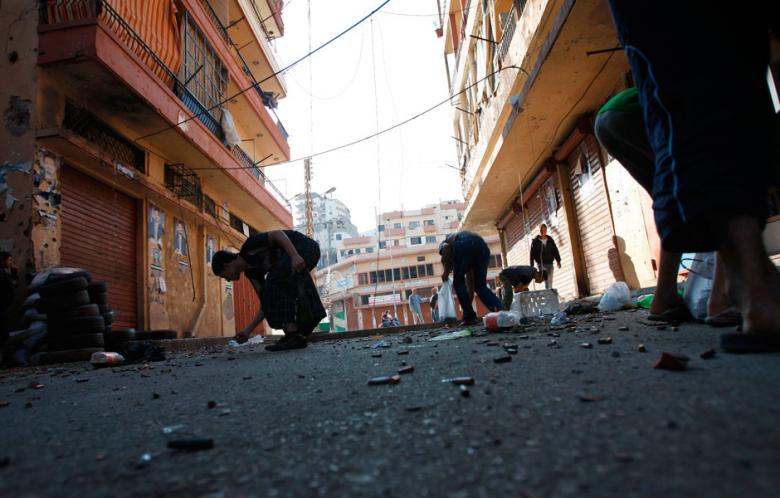
Residents collect empty bullet casings after clashes at a street in Bab el-Tebbaneh neighbourhood in Tripoli, northern Lebanon, 15 May 2012. (Photo: Reuters – Omar Ibrahim)
by Irina Papkova
Over the past few months, the eyes of the broadly defined international community have been glued to the unraveling situation in Syria. Certainly the Syrian story is fascinating – it is dangerous, frightening and what’s more, murky, due to the government’s ban on foreign journalists. At the same time, the focus on Syria has meant an almost complete lack of attention to an equally fascinating story next door, in the tiny country of Lebanon. This is unfortunate for a whole host of reasons, not least of which is that, unlike Syria, Lebanon is fully accessible to outside observers.
The story in Lebanon is that of an unfolding tragic and heroic resistance. Despite all odds, this divided and fractious society is refusing to be pulled into the Syrian civil war. For the past fifteen months, Lebanese Prime Minister Najib Mikati has pursued a policy of dissociation from the internal turmoil rocking Lebanon’s much larger neighbor. The difficulties of doing so are manifold. Historically, Lebanon and Syria have been intertwined both politically and economically; most recently, Syria occupied Lebanon from 1982 to 2005. Even post 2005, the Assad government has attempted to meddle in Lebanon’s internal affairs, often with success. The situation is complicated by the fact that Lebanese society is religiously divided along lines that are similar to those in Syria. There is of course a difference: in Syria, the Muslim majority is an established fact, whereas in Lebanon it is difficult to speak of the predominance of one or other religion. Still, in Lebanon the religious divide is very much tied to the political, and here the question of the relationship of a particular religious group to its co-religionists in Syria becomes potentially explosive.
In late May, the latent tensions did in fact explode, with two successive weekends of violence in both the northern Lebanese city of Tripoli, next to the border with Syria. The violence stemmed from confrontation between two neighborhoods, one a Sunni Muslim neighborhood inhabited by opponents of the Assad regime and the other inhabited by Alawites who support the Syrian president. Several dozen people lost their lives. The episodes have been interpreted unanimously by the Lebanese press as a plot by the Syrians to draw Lebanon into their civil war, though there are disagreements as to whether the instigators were the Syrian regime or the opposition.
For two weeks, Lebanon lived on the knife edge of a sectarian civil war. And here the truly interesting part of this story begins to emerge. Instead of succumbing to the violent impulse, Lebanese society has stood up in refusal of the worst case scenario being presented to them. The leaders of all the political parties, the major religious leaders, and civil society actors have all publicly called for calm and for the need to resolve the country’s very real existing religious, social and political problems through dialogue. President Michel Sleiman invited all of the political parties to resume a previously suspended national dialogue; it’s been ongoing since June 11, so far with at least temporarily peaceful results. Even the militant Shiite party Hezbollah, the usual suspect in the destabilization of Lebanon and heavily linked to the Syrian government, has called loudly for a peaceful resolution.
Many problems certainly remain, and it is not at all clear that Lebanon will be able to avoid the slide into a sectarian civil war as long as the conflict in Syria continues. However, it is heartening that at least the initial “gut reaction” of the Lebanese has been to reject such an outcome – in Tripoli, for example, civil society activists of all religious backgrounds took to the streets in the immediate aftermath of the recent violence in a protest march clamoring for peace. Some suspect that for many politicians, calling for peace is useful as a rhetorical device and nothing more; still, the desire for peace is evident on all levels of a Lebanese society tired and exhausted by decades of war and political instability. It is particularly obvious on the weekends in Beirut, where the youth take to the streets not to fight but to party at dozens of trendy clubs and bars of the Sunni Hamra neighborhood – for them, the burning question is how to preserve the precarious economic good fortune that has characterized life here since the expulsion of the Syrians in 2005.
Irina Papkova is Assistant Professor of International Relations and European Studies at Central European University. She received her Ph.D. from the Government Department of Georgetown University and has previously taught at Georgetown and George Washington Universities. Her book, “The Orthodox Church and Russian Politics,” was published by Oxford University Press and Woodrow Wilson Center Press in 2011. Read Irina’s previous posts on the Russian Orthodox Church here, and read the Revealer review of her book here. Irina’s current research includes Lebanese politics and the Secular Lebanon movement.
With support from the Henry R. Luce initiative on Religion and International Affairs.
